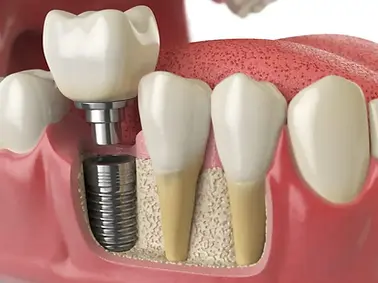
Dental implants
Dental implants* offer one of the best options for restoring missing teeth, whether it be one, several, or all missing teeth. Unlike bridges, implants have the advantage of being able to stand alone and not affect adjacent teeth.
Additionally, implants offer an excellent solution for those who are tired of loose, ill-fitting dentures or partials, because they "click" into the implant and have the option of being fixed or removable, depending on your needs.
Each patient has a unique case and will need to be thoroughly examined to see if implants are a beneficial option, since there are many different factors that determine if an individual is a good candidate.
*Implant services are available in the Jefferson office only.
Why Do I Need Dental Implants?
It is important to replace a lost tooth, as the consequences of doing nothing can grow into a much larger problem as time goes on. Dental implants are necessary when you have missing teeth, but either cannot or do not want to get dentures, bridges, or crowns.
Dental implants support a healthy bite, keeping each tooth properly in place, and preventing bone deterioration.
Dental implants may also feel necessary for the visual aspect. You may feel self-conscious about how your smile looks and feels, and dental implants can help with that. Your self-esteem and self-confidence are important, and being able to eat comfortably, smile, and laugh without worry will have a positive impact on your life.
What are the Benefits of Dental Implants?
Dental implants have several benefits. They look and feel like your real teeth, can boost your confidence, are durable, and help support your overall oral health.
They also assist in supporting your speech, comfort, and your chewing abilities.
With dental implants, you do not have to remove them and you can brush, floss, eat, drink, and sleep with your dental implants in, compared to alternatives such as dentures.

Choosing dental implants is a big decision. They may be expensive, but the success rate is about 95 percent.
Getting Dental Implants
When you get dental implants, you are replacing the tooth roots with dental posts made of metal; these posts are like screws for artificial teeth.
How your dentist performs the dental procedure depends on the implant you need, if you have any allergic reaction, and the condition of the jawbone. You may have to have several dental procedures so that your bone can heal properly around the implant. This healing could take time, but will support the new tooth securely.
Initial Evaluation
We will first do a comprehensive examination to determine the condition of your jawbone and the best dental implant procedure. This initial evaluation includes X-rays, taking impressions, and matching the color of your teeth to make your implant look as natural as possible.
You will also discuss all your medical conditions and medications. Depending on your condition or orthopedic implants, you may need to take antibiotics before the surgery to avoid infection.
Tooth Extraction
If you still have a remaining tooth that needs replacing, your dentist will remove it before the dental work is performed.
Your dentist will discuss anesthesia options. Most likely, your dentist will use a local anesthetic of novocaine (or lidocaine) to feel numb and take away any pain. It shouldn't take long to remove the tooth unless it's fractured.
You will just feel a little tug and pressure while the tooth is extracted. After you get the extraction, you should avoid blowing your nose, smoking, spitting excessively, or drinking through a straw. These actions can create a painful dry socket.
Inserting the Dental Implant and Bone Grafting
Your jaw needs to be strong because there is a lot of pressure when you chew, and you need your bone to be strong to protect your implant. If your jaw needs some extra bone, this typically comes from another area of your jawbone, away from the implant area.
You may have to let the bone heal first if you have a graft before we add the implant. Once the bone heals, we will add the implant.
After the implant is added to your jawbone, the jawbone will begin to grow around the implant. The implant then becomes part of your natural gum line. This process varies by person and can take anywhere from 3-9 months.
Abutment Placement
Once your implant is stable enough, we will place an abutment on top of the implant. This piece connects the implant to your crown.
You will not feel anything during this procedure other than a little pressure. You will get local anesthesia to that area.
Adding the Permanent Crown
After your gums heal, we will make your artificial tooth. You can now smile, eat, and laugh with confidence!
.png)